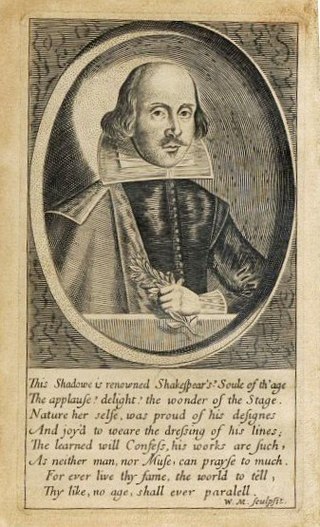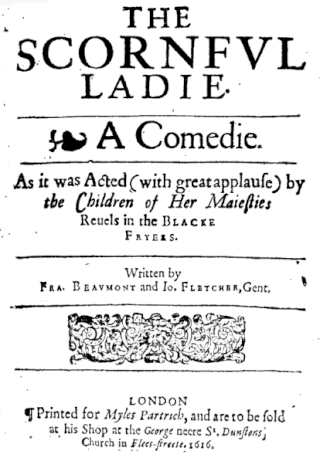Related Research Articles

Thomas Killigrew was an English dramatist and theatre manager. He was a witty, dissolute figure at the court of King Charles II of England.

Francis Kirkman appears in many roles in the English literary world of the second half of the seventeenth century, as a publisher, bookseller, librarian, author and bibliographer. In each he is an enthusiast for popular literature and a popularising businessman, described by one modern editor as "hovering on the borderline of roguery".
Humphrey Moseley was a prominent London publisher and bookseller in the middle seventeenth century.

John Benson was a London publisher of the middle seventeenth century, best remembered for a historically important publication of the Sonnets and miscellaneous poems of William Shakespeare in 1640.
The Beaumont and Fletcher folios are two large folio collections of the stage plays of John Fletcher and his collaborators. The first was issued in 1647, and the second in 1679. The two collections were important in preserving many works of English Renaissance drama.
Henry Herringman (1628–1704) was a prominent London bookseller and publisher in the second half of the 17th century. He is especially noted for his publications in English Renaissance drama and English Restoration drama; he was the first publisher of the works of John Dryden. He conducted his business under the sign of the Blue Anchor in the lower walk of the New Exchange.

The Scornful Lady is a Jacobean era stage play, a comedy written by Francis Beaumont and John Fletcher, and first published in 1616, the year of Beaumont's death. It was one of the pair's most popular, often revived, and frequently reprinted works.
Walter Burre was a London bookseller and publisher of the Elizabethan and Jacobean eras, best remembered for publishing several key texts in English Renaissance drama.

William Ponsonby was a prominent London publisher of the Elizabethan era. Active in the 1577–1603 period, Ponsonby published the works of Edmund Spenser, Sir Philip Sidney, and other members of the Sidney circle; he has been called "the leading literary publisher of Elizabethan times."
Thomas Cotes was a London printer of the Jacobean and Caroline eras, best remembered for printing the Second Folio edition of Shakespeare's plays in 1632.
Andrew Crooke and William Cooke were London publishers of the mid-17th-century. In partnership and individually, they issued significant texts of English Renaissance drama, most notably of the plays of James Shirley.
Nicholas Okes was an English printer in London of the Jacobean and Caroline eras, remembered for printing works of English Renaissance drama. He was responsible for early editions of works by many of the playwrights of the period, including William Shakespeare, Ben Jonson, John Webster, Thomas Middleton, Thomas Dekker, Thomas Heywood, James Shirley, and John Ford.
John Waterson was a London publisher and bookseller of the Jacobean and Caroline eras; he published significant works in English Renaissance drama, including plays by William Shakespeare, John Fletcher, John Webster, and Philip Massinger.
Humphrey Robinson was a prominent London publisher and bookseller of the middle seventeenth century.
John Marriot and his son Richard Marriot were prominent London publishers and booksellers in the seventeenth century. For a portion of their careers, the 1645–57 period, they were partners in a family business.
John Martyn, or Martin, was a prominent London publisher and bookseller in the second half of the 17th century.
Francis Constable was a London bookseller and publisher of the Jacobean and Caroline eras, noted for publishing a number of stage plays of English Renaissance drama.
Thomas Walkley was a London publisher and bookseller in the early and middle seventeenth century. He is noted for publishing a range of significant texts in English Renaissance drama, "and much other interesting literature."
William Leake, father and son, were London publishers and booksellers of the late sixteenth and the seventeenth centuries. They were responsible for a range of texts in English Renaissance drama and poetry, including works by Shakespeare and Beaumont and Fletcher.
Sarah Griffin was a professional printer who worked in London in the seventeenth century. She ran her own business from 1652 when she inherited the printing house of her ex-husband, Edward. By 1668 she was operating two presses and employed one apprentice and six workmen. Her varied output included multiple editions of Rose's Almanac for the Stationers' Company along with works in Latin and French. Along with her son Bennett-John she printed the first published work by the poet Thomas Traherne, a work of Church history called Roman Forgeries (1673).
References
- ↑ W. W. Greg, A List of English Plays Written before 1643 and Printed before 1700, London, The Bibliographical Society/Blades, East & Blades, 1900.
- ↑ W. Lee Ustick, "The Courtier and the Bookseller: Some Vagaries of Seventeenth-Century Publishing," Review of English Studies Vol. 5 No. 18 (April 1929), pp. 146-8.
- ↑ Henry Robert Plomer, A Dictionary of the Booksellers and Printers Who Were at Work in England, Scotland and Ireland from 1641 to 1667, London, The Bibliographical Society/Blades, East & Blades, 1907; p. 66.